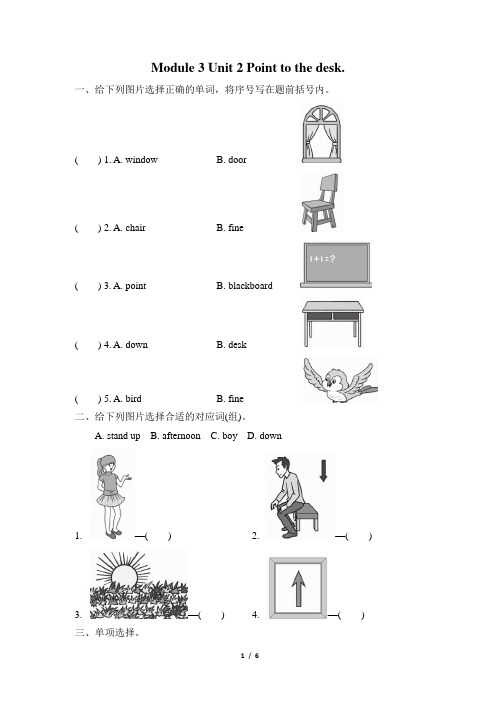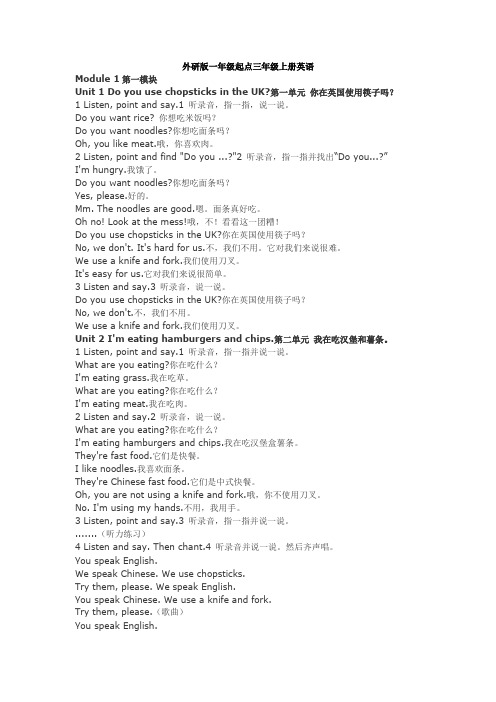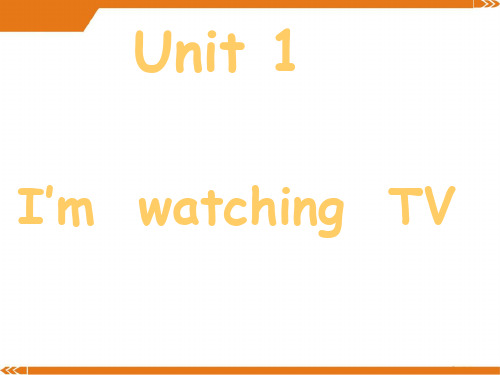外研版英语3上unit 2 i'm watching tv 同步练习(无答案)
- 格式:doc
- 大小:27.50 KB
- 文档页数:2


北师大版三年级上册英语看电视精品练习题 (3)北师大版三年级上册英语《看电视》精品练题 (3)一、选择题1. — What are you doing?— __I'm watching TV__.- A. You are watching TV- B. I'm watching TV- C. She's watching TV- D. He's watching TV2. __Does he__ like watching cartoons?- A. Is he- B. Does he- C. Do he- D. He does3. — __What does__ he watch on TV?— He watches sports programs.- A. Where does- B. How does- C. What does- D. When does4. Lucy often __watches__ TV __in the evening__.- A. watch; at evening- B. watched; in an evening- C. watches; on evening- D. watches; in the evening5. I like __cartoons__, but I don't like __animal shows__. - A. a; an- B. an; a- C. a; a- D. an; an6. — __What is__ she doing?— She is watching a movie.- A. What is- B. What does- C. Who is- D. Who does7. — ____ the boy _____ his homework in the evening? — Yes, he __does__.- A. Do; do; don't- B. Does; do; do- C. Do; does; doesn't- D. Does; does; does8. — Look, he ______ video games ______.- A. playing; on TV- B. play; on TV- C. plays; in TV- D. is playing; on TV二、动词填空1. Lucy often __watches__ (watch) TV __in the evening__.2. My brother __likes__ (like) watching sports programs.3. What __does__ (do) he __watch__ (watch) on TV?4. We __are__ (be) __watching__ (watch) a movie right now.5. They __watched__ (watch) an interesting show yesterday.三、阅读理解Mr. Smith is a teacher. He __likes__ (like) __watching__ (watch) TV. On __Saturdays__, he __usually__ (usually) __stays__ (stay) at home and __watches__ (watch) TV in the evening. He __likes__ (like) to watch sports programs, __cartoons__, and __news__.__Last Sunday__, he __watched__ (watch) a basketball match. On __Monday__, he __watched__ (watch) a very funny cartoon. Yesterday __afternoon__, he __watched__ (watch) the news. Mr. Smith __thinks__ (think) watching TV is very __interesting__.1. What does Mr. Smith usually do on Saturdays?- A. He goes out.- B. He stays at home and watches TV.- C. He plays basketball.- D. He watches a movie.2. What did Mr. Smith watch last Sunday?- A. A basketball match.- B. A cartoon.- C. The news.- D. A movie.3. When did Mr. Smith watch the news?- A. On Saturday evening.- B. On Monday.- C. Yesterday afternoon.- D. Last Sunday.4. How does Mr. Smith feel about watching TV?- A. He thinks it is boring.- B. He thinks it is interesting.- C. He doesn't like it.- D. He likes playing basketball more.四、书面表达假如你是Amy,请根据下面表格中的信息,写一篇不少于60字的短文,介绍一下你和你的朋友Lucy的看电视惯。

Module 3 Unit 2Point to the desk.一、给下列图片选择正确的单词,将序号写在题前括号内。
() 1. A. window B. door() 2. A. chair B. fine() 3. A. point B. blackboard() 4. A. down B. desk() 5. A. bird B. fine二、给下列图片选择合适的对应词(组)。
A. stand upB. afternoonC. boyD. down1. —()2. —()3. —()4. —()三、单项选择。
() 1. ________ up, please!A. ChairB. StandC. What() 2. Sit ________, please.A. toB. byC. down() 3. —________ your name?—Tweettweet!A. HowB. WhatC. What’s() 4. ________ to the window.A. PointB. HowC. Are() 5. Point ________ the blackboard.A. toB. downC. too四、给下列句子选择对应的图片。
() 1. Point to the desk. A.() 2. Stand up! B.() 3. Hello, I’m a bird. C.() 4. Sit down! D.() 5. Point to the door. E.五、情景交际。
() 1. 上课时班长请大家起立向老师问好,他会说:________ () 2. 妈妈想让你指一指窗户,她应说:________() 3. 小鸟Tweettweet飞走了,你会说:________() 4. 回答完问题后,英语老师会对你说:________() 5. 你在公园结识了一位新朋友,你想知道他的名字,你应问:________A. Sit down, please.B. Point to the window.C. What’s your name?D. Stand up.E. Byebye, Tweettweet.六、连词成句。

外研版一年级起点三年级上册英语Module 1第一模块Unit 1 Do you use chopsticks in the UK?第一单元你在英国使用筷子吗?1 Listen, point and say.1 听录音,指一指,说一说。
Do you want rice? 你想吃米饭吗?Do you want noodles?你想吃面条吗?Oh, you like meat.哦,你喜欢肉。
2 Listen, point and find "Do you ...?"2 听录音,指一指并找出“Do you...?”I'm hungry.我饿了。
Do you want noodles?你想吃面条吗?Yes, please.好的。
Mm. The noodles are good.嗯。
面条真好吃。
Oh no! Look at the mess!哦,不!看看这一团糟!Do you use chopsticks in the UK?你在英国使用筷子吗?No, we don't. It's hard for us.不,我们不用。
它对我们来说很难。
We use a knife and fork.我们使用刀叉。
It's easy for us.它对我们来说很简单。
3 Listen and say.3 听录音,说一说。
Do you use chopsticks in the UK?你在英国使用筷子吗?No, we don't.不,我们不用。
We use a knife and fork.我们使用刀叉。
Unit 2 I'm eating hamburgers and chips.第二单元我在吃汉堡和薯条。
1 Listen, point and say.1 听录音,指一指并说一说。
What are you eating?你在吃什么?I'm eating grass.我在吃草。


三年级上册英语教案Module 2 Unit 2 I’mwatching TVUnit 2 I’m watching TV.本单元主要围绕〝What are you doing?〞这一主题展开各种教学活动,并以这一主题引出如今停止时的普通疑问句,否认句以及特殊疑问句等言语功用。
本单元旨在发明一个轻松、愉快的学习、交流环境,经过听、说、读、写来培育先生综合运用这些知识的才干。
并让先生能在〝做中学〞〔learning by doing〕,经过有限的课堂实际活动,留意观察他人的举动,能准确地用英语来表达。
1.能听懂、会说、会认读单词及词组:water, flowers, watching TV, running, listening to music…2.能熟练运用句型:What are you doing? I'm watching TV.What's he/she doing? He/ She's reading.What are they doing? They're watching TV.【才干目的】1.能用如今停止时的各种方式停止准确的描画和表达正在发作的举措。
2.能掌握如今停止时态及一些表示详细举措的词组搭配,如:doing homework, watching TV, eating dinner…【情感目的】经过对本单元的义务性活动,我的目的是能培育培育先生学习英语的剧烈兴味,乐于参与各种活动的积极情感,乐于协作,培育先生勾搭协作的肉体。
【教学重点】重要句型要求先生会说并用于实践生活中。
What are you doing? I'm watching TV.What's he/she doing? He/ She's reading.【教学难点】能正确表达正在停止的事情。
A:Pre-reading1. Greeting2. Review the last storyDo some talks:What are you doing/ We’re making…Step 2. PreviewUse 2 boxes 动词ing变形,造句Box A: I’m we’re he is she isBox B: wacth TV make a cake…Step 3. Presentation1.同窗们你们还记不记得在上个单元,Amy和Sam正在做蛋糕,那么让我们看看他们有没有完成?好吗?Let’s see page 11 and find out 〝who is watching TV〞, 〝who is listening to music?〞让我们一同看看课本第11页,谁正在看电视,又是谁正在听音乐?2.教员再次播放听力先生完成相关效果:What is mum doing?What is dad doing?What are they doing?3.请同窗扮演对话Step 4. Practice1.教员快速闪现图片让先生用如今停止时描画图片上人物停止的举措。
Unit 1I’m Ms Smart.一、判断下列词汇与图片是否相符,相符的打“√”,不相符的打“×”。
() 1. girl() 2. Ms Smart() 3. Ms Li() 4. boy() 5. Amy二、根据汉语或图片提示,选择正确的选项补全句子。
() 1. Hello, ________!A. boyB. boysC. girls() 2. Good morning, I’m ________.A. Mr LiB. Ms SmartC. Lingling() 3. I’m fine.________A. I’m Sam.B. And you?C. Goodbye.() 4. —Good morning, girls.—________, Ms Smart.A. HiB. Bye-byeC. Good morning()5. I’m fine ________.A. tooB. thankC. and三、花落谁家。
(选词填空,将序号写在横线上)too Goodbye and I’m areA. B. C. D. E.1. Good morning, boys ________ girls.2. I’m fine ________. Thank you.3. Hello, Ms Smart.________ Lingling.4. How ________ you, Lanlan?5. ________, Xiaoyong.四、情景交际。
() 1. 早上见到王老师,你应说:________A. Good morning, Ms Wang.B. Goodbye, Ms Wang.() 2. 询问朋友身体状况时,你可以说:________A. I’m fine.B. How are you?() 3. 别人帮助了你,你应说:________A. Thank you.B. And how are you?() 4. Tutu向同学介绍自己时会说:________A. Hello, I’m Tutu.B. Hello, Tutu.() 5. 早上上课时,老师会对同学们说:________A. Good morning, boys and girls!B. Good afternoon, boys and girls!五、找出合适的应答语并连线。
Module3 Unit2同步习题一、Read and match.(我会连。
)(1) chair A.(2) blackboard B.(3) stand up C.(4) desk D.(5) window E.二、Read and choose.(我会选。
)( ) 1. window 门 A. √ B. ×( ) 2. bird 狗 A. √ B. ×( ) 3. stand up 起立 A. √ B. ×( ) 4. chair椅子 A. √ B. ×三、Read and application.(我会用。
)( ) 1. 当你想让别人坐下时,你应说:A. Sit down, please.B. Stand up, please. ( ) 2. 你的朋友想让你指一指椅子时,他应说:A. Point to the door.B. Point to the chair. ( ) 3. 当你起立回答完问题后,老师会说:A. Point to the desk.B. Sit down, please.参考答案一、(1)-(5) CEABD二、1-4 BBAA三、1-3 ABB答案解析一、(1) “chair”意为椅子(2) “blackboard”意为黑板(3) “stand up”意为起立(4) “desk”意为桌子(5) “window”意为窗户二、1. “window”意为窗户2. “bird”意为小鸟3. “stand up”意为起立4. “chair”意为椅子三、1. “ Sit down, please.”意为请坐2. “Point to the chair.”意为指一指椅子3. 回答完问题后,老师会说请坐下,英语是“Sit down, please.”。